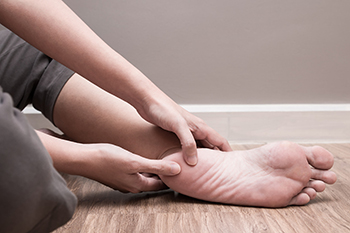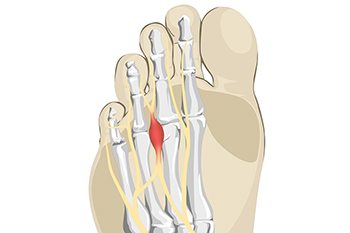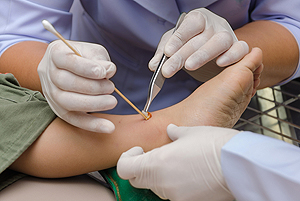Connect With Us
Blog
Items filtered by date: September 2021
Understanding Heel Bursitis
 Heel pain is one of the most common reasons people visit a podiatrist, and it can make daily activities like work and exercise almost impossible. One source of heel pain is heel bursitis. This can occur when either the bursa sac of fluid that attaches the Achilles tendon and the calcaneal tendon becomes inflamed (known as retrocalcaneal bursitis), or the padding under the heel begins to degenerate because of trauma (known as subcutaneous calcaneal bursitis). Heel pain can have a variety of causes and can affect anyone. If you are struggling with heel pain, consulting with a podiatrist can be extremely beneficial. A podiatrist will be able to properly diagnose and treat the source of the pain.
Heel pain is one of the most common reasons people visit a podiatrist, and it can make daily activities like work and exercise almost impossible. One source of heel pain is heel bursitis. This can occur when either the bursa sac of fluid that attaches the Achilles tendon and the calcaneal tendon becomes inflamed (known as retrocalcaneal bursitis), or the padding under the heel begins to degenerate because of trauma (known as subcutaneous calcaneal bursitis). Heel pain can have a variety of causes and can affect anyone. If you are struggling with heel pain, consulting with a podiatrist can be extremely beneficial. A podiatrist will be able to properly diagnose and treat the source of the pain.
Many people suffer from bouts of heel pain. For more information, contact Vivian C. Iwu, DPM of Choice Podiatry Center. Our doctor can provide the care you need to keep you pain-free and on your feet.
Causes of Heel Pain
Heel pain is often associated with plantar fasciitis. The plantar fascia is a band of tissues that extends along the bottom of the foot. A rip or tear in this ligament can cause inflammation of the tissue.
Achilles tendonitis is another cause of heel pain. Inflammation of the Achilles tendon will cause pain from fractures and muscle tearing. Lack of flexibility is also another symptom.
Heel spurs are another cause of pain. When the tissues of the plantar fascia undergo a great deal of stress, it can lead to ligament separation from the heel bone, causing heel spurs.
Why Might Heel Pain Occur?
- Wearing ill-fitting shoes
- Wearing non-supportive shoes
- Weight change
- Excessive running
Treatments
Heel pain should be treated as soon as possible for immediate results. Keeping your feet in a stress-free environment will help. If you suffer from Achilles tendonitis or plantar fasciitis, applying ice will reduce the swelling. Stretching before an exercise like running will help the muscles. Using all these tips will help make heel pain a condition of the past.
If you have any questions please contact our office located in Marietta, GA . We offer the newest diagnostic and treatment technologies for all your foot and ankle needs.
Get Professional Care for a Broken Foot or Ankle
What Does Morton’s Neuroma Feel Like?
Morton's neurom a occurs when a nerve at the base of the toes on the bottom of the foot becomes inflamed. This occurs most often between the 3rd and 4th toes. Neuromas usually form when a nerve is continually pinched or irritated, causing it to enlarge and scar. This usually causes symptoms such as a numbing and tingling sensation or a burning and shooting sensation in the ball of the foot. A Morton’s neuroma may also feel like the toes have fallen asleep or like walking with a crumpled up sock or pebble in your shoe. Eventually, Morton's neuroma will lead to aggravated pain from pressure. Pain in the foot that persists may be a sign of Morton’s neuroma and should be looked at by a podiatrist for a proper diagnosis and treatment method.
a occurs when a nerve at the base of the toes on the bottom of the foot becomes inflamed. This occurs most often between the 3rd and 4th toes. Neuromas usually form when a nerve is continually pinched or irritated, causing it to enlarge and scar. This usually causes symptoms such as a numbing and tingling sensation or a burning and shooting sensation in the ball of the foot. A Morton’s neuroma may also feel like the toes have fallen asleep or like walking with a crumpled up sock or pebble in your shoe. Eventually, Morton's neuroma will lead to aggravated pain from pressure. Pain in the foot that persists may be a sign of Morton’s neuroma and should be looked at by a podiatrist for a proper diagnosis and treatment method.
Morton’s neuroma is a very uncomfortable condition to live with. If you think you have Morton’s neuroma, contact Vivian C. Iwu, DPM of Choice Podiatry Center. Our doctor will attend to all of your foot care needs and answer any of your related questions.
Morton’s Neuroma
Morton's neuroma is a painful foot condition that commonly affects the areas between the second and third or third and fourth toe, although other areas of the foot are also susceptible. Morton’s neuroma is caused by an inflamed nerve in the foot that is being squeezed and aggravated by surrounding bones.
What Increases the Chances of Having Morton’s Neuroma?
- Ill-fitting high heels or shoes that add pressure to the toe or foot
- Jogging, running or any sport that involves constant impact to the foot
- Flat feet, bunions, and any other foot deformities
Morton’s neuroma is a very treatable condition. Orthotics and shoe inserts can often be used to alleviate the pain on the forefront of the feet. In more severe cases, corticosteroids can also be prescribed. In order to figure out the best treatment for your neuroma, it’s recommended to seek the care of a podiatrist who can diagnose your condition and provide different treatment options.
If you have any questions, please feel free to contact our office located in Marietta, GA . We offer the newest diagnostic and treatment technologies for all your foot care needs.
Common Sports Injuries and How to Avoid Them
Sports related injuries are generally broken down into direct impact injuries, overuse injuries, and injuries that apply more force to an area of the body than it can structurally support. Some of the most common sports injuries involve joint damage, ankle sprains and strains, stress fractures, and cuts and bruises. You can reduce your risk of injury while playing sports by wearing proper footwear and protective gear, warming up and cooling down sufficiently, using proper form, cross-training to strengthen muscles and stay in shape, and building up the intensity and duration of workouts gradually. It is important to seek proper care for a sports injury, and to take a break from your sport to allow the injury to heal properly. If you have suffered a sports injury involving your feet, ankles, or lower legs, it is suggested that you have a podiatrist examine you as soon as possible.
Sports related foot and ankle injuries require proper treatment before players can go back to their regular routines. For more information, contact Vivian C. Iwu, DPM of Choice Podiatry Center. Our doctor can provide the care you need to keep you pain-free and on your feet.
Sports Related Foot and Ankle Injuries
Foot and ankle injuries are a common occurrence when it comes to athletes of any sport. While many athletes dismiss the initial aches and pains, the truth is that ignoring potential foot and ankle injuries can lead to serious problems. As athletes continue to place pressure and strain the area further, a mild injury can turn into something as serious as a rupture and may lead to a permanent disability. There are many factors that contribute to sports related foot and ankle injuries, which include failure to warm up properly, not providing support or wearing bad footwear. Common injuries and conditions athletes face, including:
- Plantar Fasciitis
- Plantar Fasciosis
- Achilles Tendinitis
- Achilles Tendon Rupture
- Ankle Sprains
Sports related injuries are commonly treated using the RICE method. This includes rest, applying ice to the injured area, compression and elevating the ankle. More serious sprains and injuries may require surgery, which could include arthroscopic and reconstructive surgery. Rehabilitation and therapy may also be required in order to get any recovering athlete to become fully functional again. Any unusual aches and pains an athlete sustains must be evaluated by a licensed, reputable medical professional.
If you have any questions please feel free to contact our office located in Marietta, GA . We offer the newest diagnostic and treatment technologies for all your foot and ankle needs.
Six Ways to Treat Diabetic Foot Ulcers
Diabetic foot ulcers (DFUs) are wounds that occur on the feet of diabetic patients. These wounds may heal poorly, slowly, and have an increased risk of becoming infected. Because of this, prompt and proper wound care is necessary. Your podiatrist may treat your DFU by keeping pressure off of the wound using casts, boots, specialty shoes, or off-loading devices. The wound may also need to be debrided, which involves removing dead or damaged tissue and any foreign objects from the wound. You will then need to keep the foot clean and dry and moisturize the area with a prescribed cream to promote healing. Your doctor might also suggest ways to improve your circulation or prescribe additional therapies to encourage the wound to heal. For more information about caring for DFUs, please consult with a podiatrist.
Wound care is an important part in dealing with diabetes. If you have diabetes and a foot wound or would like more information about wound care for diabetics, consult with Vivian C. Iwu, DPM from Choice Podiatry Center. Our doctor will assess your condition and provide you with quality foot and ankle treatment.
What Is Wound Care?
Wound care is the practice of taking proper care of a wound. This can range from the smallest to the largest of wounds. While everyone can benefit from proper wound care, it is much more important for diabetics. Diabetics often suffer from poor blood circulation which causes wounds to heal much slower than they would in a non-diabetic.
What Is the Importance of Wound Care?
While it may not seem apparent with small ulcers on the foot, for diabetics, any size ulcer can become infected. Diabetics often also suffer from neuropathy, or nerve loss. This means they might not even feel when they have an ulcer on their foot. If the wound becomes severely infected, amputation may be necessary. Therefore, it is of the upmost importance to properly care for any and all foot wounds.
How to Care for Wounds
The best way to care for foot wounds is to prevent them. For diabetics, this means daily inspections of the feet for any signs of abnormalities or ulcers. It is also recommended to see a podiatrist several times a year for a foot inspection. If you do have an ulcer, run the wound under water to clear dirt from the wound; then apply antibiotic ointment to the wound and cover with a bandage. Bandages should be changed daily and keeping pressure off the wound is smart. It is advised to see a podiatrist, who can keep an eye on it.
If you have any questions, please feel free to contact our office located in Marietta, GA . We offer the newest diagnostic and treatment technologies for all your foot care needs.




